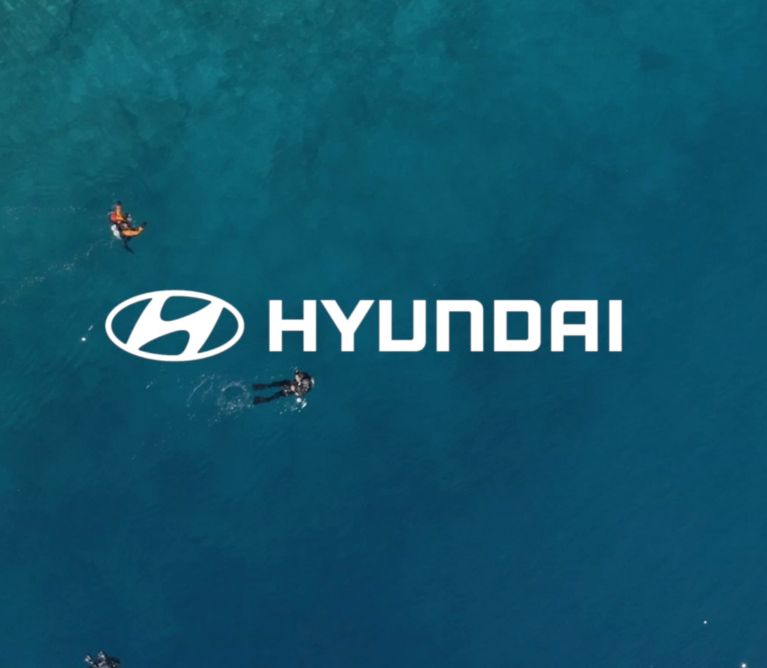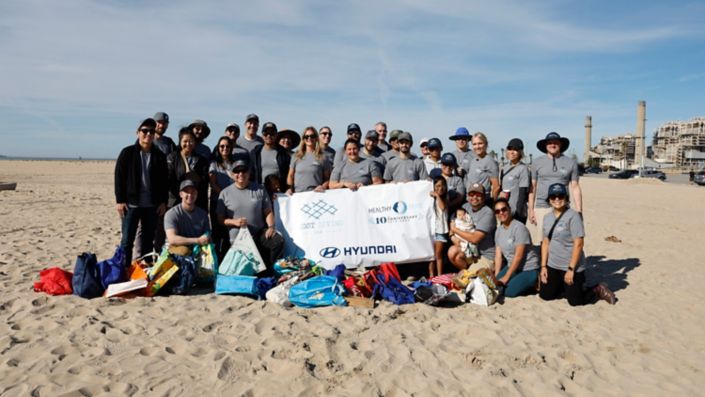- The pan-European partnership between Hyundai Motor and Healthy Seas kicked off in April 2021
- Partnership activities include beach clean-ups, ocean clean-ups, and educational programmes for children in Greece, Spain, Italy, France, the Netherlands, the UK, and Germany
- In total, Healthy Seas has collected more than 78 tonnes of waste from the oceans thanks to Hyundai’s support
- Marine conservation organisation Healthy Seas is committed to freeing the oceans of abandoned fishing nets and other waste through education, prevention, and clean-up activities
- The partnership supports a circular economy by regenerating collected waste into ECONYL® regenerated nylon for sustainable products, such as the floormats in IONIQ 5
Since the beginning of their partnership in April, Hyundai Motor and Healthy Seas have held eleven activations in seven European countries to date. The collaboration was initiated with the clear goal and commitment to developing a sustainable society by combatting ocean pollution, nurturing underwater ecosystems, and driving a circular economy.
The partnership’s activations range from waste collection activities, such as beach clean-ups and diving events to recover abandoned fishing nets, to educational programmes to teach children and local communities about the importance of keeping the world’s oceans clean.
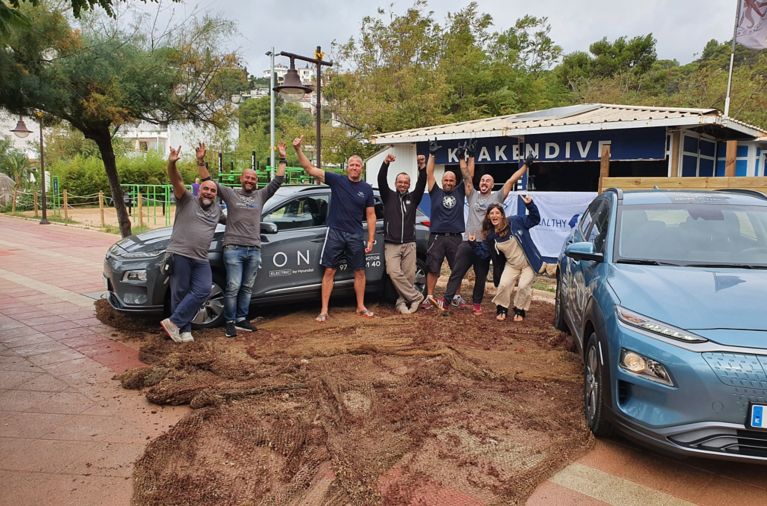
We are committed to providing Progress for Humanity through all our actions. It’s not enough that we are a leader in clean and future mobility solutions, we are also taking measures to protect the underwater world as well. It is extraordinary what we have been able to accomplish so far with our partnership with Healthy Seas. Next year, we look forward to expanding our cooperation with coastal communities, children, and our employees.
Kick-off event in Greece
Hyundai and Healthy Seas held their kick-off event for their partnership from 8 to 16 June in Ithaca. A storm picked up nets and other debris from an abandoned fish farm and scattered them into the sea, harming the local community and marine life.
For the kick-off event, the partnership organised underwater and beach clean-ups, as well as recycled, upcycled, and properly disposed of recovered waste. On top of that, the local community could attend a public event to learn more about marine litter and abandoned fishing nets, or ghost nets.
To date, this was Healthy Seas’ largest project in terms of positive environmental impact and community involvement. Thanks to 45 participants, 20 divers, and 15 organisations, the event delivered great results in a short amount of time. The team cleaned four beaches and two bays in up to 30 metres of depth, recovering five tonnes of fishing nets, 32 tonnes of metal, and 39 tonnes of plastic waste, including 150 bags of polystyrene foam beads.
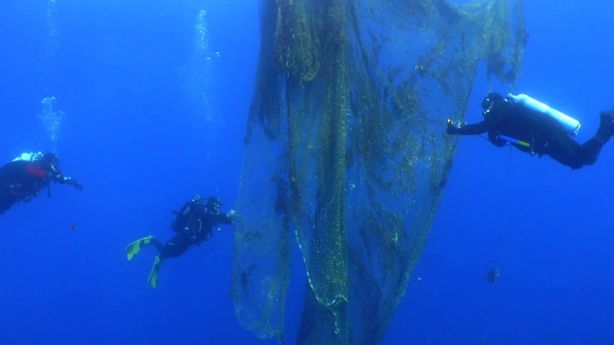
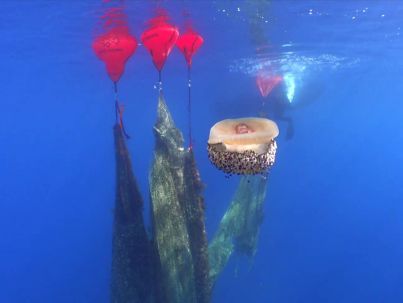
Diving sea clean-up to protect biodiversity
As part of the partnership, Hyundai supports Healthy Seas with diving activities to retrieve ghost nets. So far, the partnership supported sea clean-up dives around Ijmuiden in the Netherland, the Italian Lampedusa, Newcastle in the UK, the German Norderney, and Tossa del Mar in Spain. Across all clean-up activities, 72 volunteer divers helped recover ghost nets and other waste from European waters.
Whether exploring shipwrecks, reefs, or beaches, Healthy Seas collected more than 78 tonnes of waste in the form of ghost nets, crab and lobster cages, lead, and other marine litter.
We are very appreciative of our partnership with Hyundai because it enables us to undertake projects that positively impact the environment on a scale that we could have never imagined. It has been a pleasure working with Hyundai, and we look forward to accomplishing even more together in the coming year.
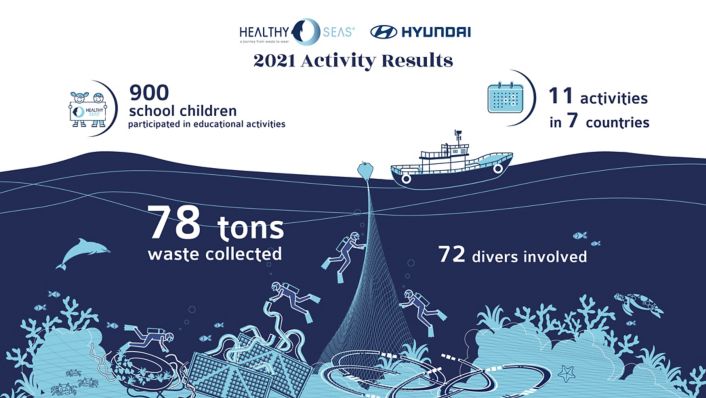
Educating children about ghost nets and marine protection
In addition to underwater clean-ups, the partnership also brought educational events to Valencia, the Dutch Ijmuiden, Milan, Paris, Costa Brava in Spain, and on the German island of Sylt. Most educational programmes were geared towards children from local schools, and since the start of the partnership, 900 children have participated. On top of interactive presentations on ocean protection and the ghost fishing phenomenon, the children could participate in beach clean-up activities, enjoy the Healthy Seas Virtual Reality Experience, play educational games, and observe recovered nets.
The educational event in Valencia was part of the pan-European test drive for IONIQ 5. The workshop aimed to educate lifestyle and sustainability influencers and media on marine conservation and environmental protection.
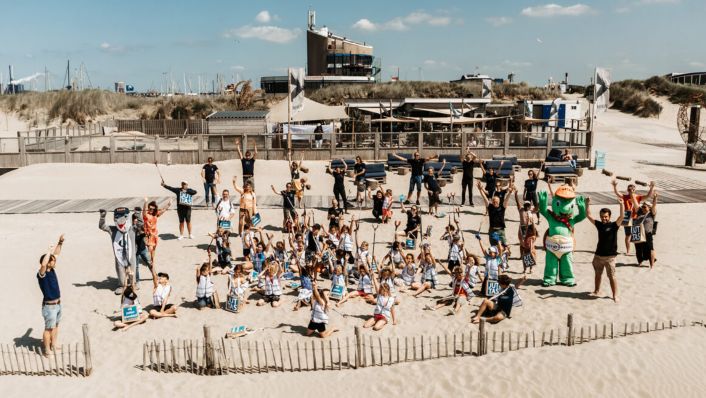
From waste to sustainable products
Hyundai is a leader in sustainable and innovative mobility solutions, so cleaning up the world’s oceans and educating communities on marine pollution fall under its global strategy. To deliver on its vision of Progress for Humanity, Hyundai and Healthy Seas promote a circular economy.
Turning waste into a new resource, Healthy Seas’ founding partner Aquafil regenerates the nylon parts of the nets, along with other nylon waste, into ECONYL® regenerated nylon. This recycled nylon yarn is used to manufacture sustainable products, such as swimwear and carpeting.
Since launching the fully-electric midsize CUV earlier this year, Hyundai has been giving European customers the option of outfitting their IONIQ 5 with sustainable floor mats made with ECONYL® fibre.
About Healthy Seas
The mission of Healthy Seas is to remove waste from the seas, in particular fishing nets, for the purpose of creating healthier seas and recycling marine litter into textile products. The recovered fishing nets will be transformed and regenerated by Aquafil into ECONYL® yarn, a high-quality raw material used to create new products, such as socks, swimwear, sportswear, or carpets. Since its founding in 2013, Healthy Seas has collected over 585 tons of fishing nets with the help of volunteer divers and fishermen.
Disclaimer: CO2 and emissions data for IONIQ 5
- Electricity consumption combined for the Hyundai IONIQ 5 58 kWh (19” alloy rims) with 2WD in kWh/100 km: 16.7; CO2 emissions combined in g/km: 0 (WLTP)
- Electricity consumption combined for the Hyundai IONIQ 5 58 kWh (19” alloy rims) with 4WD in kWh/100 km: 18.1; CO2 emissions combined in g/km: 0 (WLTP)
- Electricity consumption combined for the Hyundai IONIQ 5 72.6 kWh (19” alloy rims) with 2WD in kWh/100 km: 16.8; CO2 emissions combined in g/km: 0 (WLTP)
- Electricity consumption combined for the Hyundai IONIQ 5 72.6 kWh (20” alloy rims) with 2WD in kWh/100 km: 17.9; CO2 emissions combined in g/km: 0 (WLTP)
- Electricity consumption combined for the Hyundai IONIQ 5 72.6 kWh (19” alloy rims) with 4WD in kWh/100 km: 17.7; CO2 emissions combined in g/km: 0 (WLTP)
- Electricity consumption combined for the Hyundai IONIQ 5 72.6 kWh (20” alloy rims) with 4WD in kWh/100 km: 19.0; CO2 emissions combined in g/km: 0 (WLTP)

